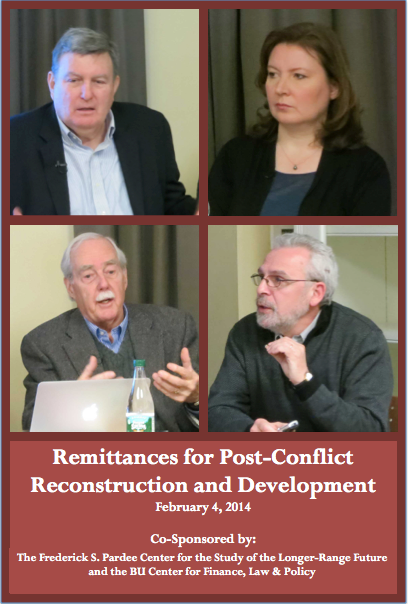Task Force Leaders Discuss Remittances at Pardee Seminar
Members of the most recent Pardee Center Task Force Report Remittance Flows to Post-Conflict States: Perspectives on Human Security and Development discussed the findings from their groundbreaking research at a Pardee House Seminar held on February 4, 2014.
 The Seminar was led by Task Force co-conveners Donald F. Terry (BU School of Law) and Prof. John R. Harris (BU Dept of Economics), and featured presentations by the Task Force’s lead researcher Daivi Rodima-Taylor and guest speaker Prof. Nikos Passas (Northeastern University).
The Seminar was led by Task Force co-conveners Donald F. Terry (BU School of Law) and Prof. John R. Harris (BU Dept of Economics), and featured presentations by the Task Force’s lead researcher Daivi Rodima-Taylor and guest speaker Prof. Nikos Passas (Northeastern University).
BU School of Law Lecturer Donald Terry opened the seminar by bringing the value of remittances into perspective, citing that, worldwide, money sent home to family and friends from international diaspora accounts for three to four times the amount of official foreign development aid from places like the United States and Europe. He also highlighted that a quarter of those remittances are sent to so-called “post-conflict” states and are imperative for reconstruction in some of the world’s most unstable areas.
BU Department of Economics Professor John Harris discussed the three questions that the Task Force’s research attempted to answer, namely who is sending remittances and why; through what channels are remittances being sent and what are the associated costs; and how do the funds received affect recipients and their communities? He focused on those who receive remittances from abroad and how those remittances are used in post-conflict societies, highlighting that roughly half of remitted funds are used for consumption and life-style improvements while the other half are used for paying school fees and investments in other development activities such as buying stock in local businesses.
Lead researcher Daivi Rodima-Taylor outlined the main findings of the Report and highlighted the importance of viewing post-conflict remittance systems in the broader context of human security and conflict-induced vulnerability. She discussed remittance systems as part of a framework of financial inclusion and the challenges of harmonizing formal and informal remittance systems in post-conflict settings. Informal money transfer systems that rely on social connections and networks often allow for lower-cost remittances and greater inclusivity for poorer populations in conflict affected environments. Emphasizing the importance of the human dynamics of remittance flows, she pointed out the need for more research into social and cultural perceptions of indebtedness, familial obligation, and gender and generational dynamics in the contexts of forced migration.
Prof. Passas closed the panel presentation by noting that informal remitters offer a vital service but may also facilitate serious crime, not unlike western banks, especially in post conflict contexts lacking proper bank infrastructure. Regulation is necessary but must be proportionate to the risk and sensitive to socio-economic specificities. Ill-considered rules may produce “lawful but awful” practices that block access to remittance services. He argued that informal methods of money transfer are often more traceable, more reliable, and more widely available, and that people will continue to rely on these systems even if they are outlawed. He proposed that efforts to favor formal institutions will yield better results if the latter offer better services at much lower cost.
The seminar took place at the Frederick S. Pardee Center for the Study of the Longer-Range Future and was co-sponsored by the Boston University Center for Finance, Law & Policy. A videotape of the seminar is available in the Pardee Center 2014 Multimedia Archive.